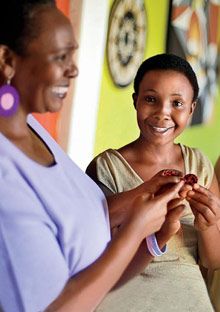From New Orleans to Rwanda: The Story Behind the Fifth Edition of the O Bracelet

Joy (left) and Brigitte (center)
PAGE 5
When Brigitte told her story to the women at Stella's gallery, with Janet translating, the tide of warmth that washed out from them almost capsized her. It was the Rwandan women's first night in town, and Stella had summoned her artists for a welcoming party, commanding: "Show them the love!"
And the women did, gathering around Brigitte, taking her hands, touching her face. Although she's 30, her skin is smooth as a girl's—as if, upon meeting up with the machete blade 15 years ago, her body closed for business, just stopped aging in its tracks. When she tearfully explained that she'd lost every member of her family, the group, without seeming to move, surrounded her and took hold.
"You have family now," said Rose Bratcher, a painter, walking up to hug her.
"You're so beautiful," added Herreast Harrison, one of the city's well-known beaders, taking Brigitte's face in her hands.
Stella came forward with two fancy umbrellas—a New Orleans tradition—and handed one to each of the guests, declaring, "We're all under the same umbrella."
And soon Ausettua Amor Amenkum, the gravelly voiced leader of an Africa-influenced dance company, had everyone in a circle clapping and chanting: "We say Ashe, we say Ashe because there is power in sisters being together. We thank you, Brigitte, for coming."
---
Wandering through the gallery after the welcome festivities ebbed, Brigitte and Janet stopped in one of the small side rooms, where they were captivated by a two-foot mannequin-like figure behind glass. The piece is called Unforgivable Blackness: a young, pitch-dark woman with big lips, high cheekbones, and wild explosions of hair, wearing a ruffled, lacy white wedding dress, her eyes closed in a way that suggests an uneasy vulnerability. It is one of Rukiya's dolls.
Rukiya Brown, who has just turned 57, has been making dolls since she was a girl in Chicago. She comes from a large family—eight brothers and sisters by four different fathers—and was raised by a mother who worked as a maid and switched price stickers at the supermarket because it was the only way she could afford to put meat on the table. The family moved to New Orleans when Rukiya was 15. That year, despite her mother's salvos about not falling for the first man who "showed his teeth," Rukiya ended up dating just such a man and eventually got pregnant. People said her boyfriend was "too fast" for her, and she found out just how fast he was when she caught him sneaking off to see his twin babies—same age as Rukiya's daughter—and their mother, another girl in another housing project.
Still, Rukiya married him and they moved to England after he joined the air force. She pulled herself together there, working in promotions for the base, studying textiles and design in London. But he'd had one too many affairs, and when she got back to New Orleans in 1995, she decided she was done with him, and got busy making dolls.
And the women did, gathering around Brigitte, taking her hands, touching her face. Although she's 30, her skin is smooth as a girl's—as if, upon meeting up with the machete blade 15 years ago, her body closed for business, just stopped aging in its tracks. When she tearfully explained that she'd lost every member of her family, the group, without seeming to move, surrounded her and took hold.
"You have family now," said Rose Bratcher, a painter, walking up to hug her.
"You're so beautiful," added Herreast Harrison, one of the city's well-known beaders, taking Brigitte's face in her hands.
Stella came forward with two fancy umbrellas—a New Orleans tradition—and handed one to each of the guests, declaring, "We're all under the same umbrella."
And soon Ausettua Amor Amenkum, the gravelly voiced leader of an Africa-influenced dance company, had everyone in a circle clapping and chanting: "We say Ashe, we say Ashe because there is power in sisters being together. We thank you, Brigitte, for coming."
Wandering through the gallery after the welcome festivities ebbed, Brigitte and Janet stopped in one of the small side rooms, where they were captivated by a two-foot mannequin-like figure behind glass. The piece is called Unforgivable Blackness: a young, pitch-dark woman with big lips, high cheekbones, and wild explosions of hair, wearing a ruffled, lacy white wedding dress, her eyes closed in a way that suggests an uneasy vulnerability. It is one of Rukiya's dolls.
Rukiya Brown, who has just turned 57, has been making dolls since she was a girl in Chicago. She comes from a large family—eight brothers and sisters by four different fathers—and was raised by a mother who worked as a maid and switched price stickers at the supermarket because it was the only way she could afford to put meat on the table. The family moved to New Orleans when Rukiya was 15. That year, despite her mother's salvos about not falling for the first man who "showed his teeth," Rukiya ended up dating just such a man and eventually got pregnant. People said her boyfriend was "too fast" for her, and she found out just how fast he was when she caught him sneaking off to see his twin babies—same age as Rukiya's daughter—and their mother, another girl in another housing project.
Still, Rukiya married him and they moved to England after he joined the air force. She pulled herself together there, working in promotions for the base, studying textiles and design in London. But he'd had one too many affairs, and when she got back to New Orleans in 1995, she decided she was done with him, and got busy making dolls.
Photo: Riccardo Gangale



